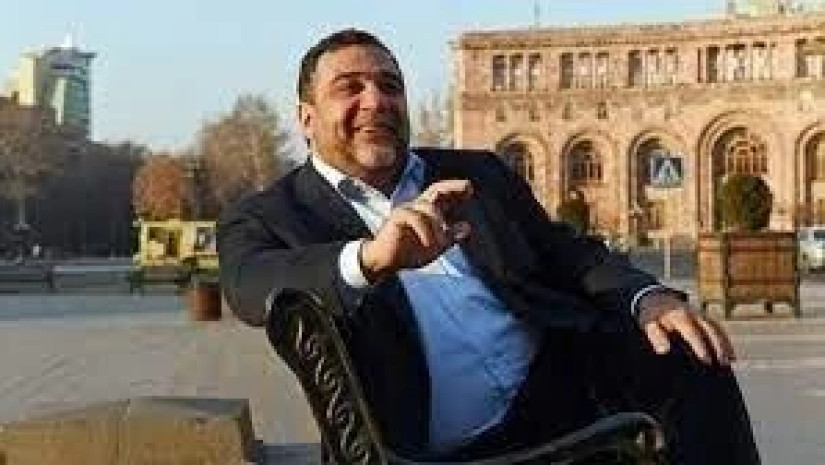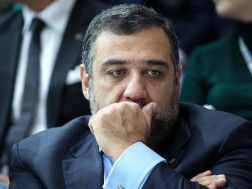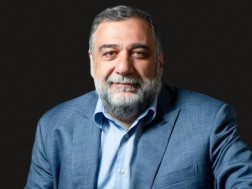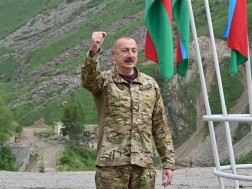Ruben Vardanyan is a Russian social entrepreneur and venture philanthropist of Armenian origin. Vardanyan, worth US$1 billion today on the Forbes Real-Time Billionaires List, is well known to the business communities around the world. Popularity of Vardanyan has expanded from business societies to ordinary citizens, even of Georgia, when he recently stated about his intention to get involved in politics. More specifically, Armenian politics. Russian billionaire of post-Soviet ethnicity, entering politics of his home country is a real déjà vu, especially for Georgians. However, Mr. Vardanyan tries to erase equal sign between him and Bidzina Ivanishvili, stating nothing is a copy-paste.
Known as one of the fathers of the Russian stock market, Vardanyan was the CEO of investment company Troika Dialog in the early 1990s. In 2013, Vardanyan and his managers sold Troika Dialog to state-owned Sberbank for $1.4 billion. Vardanyan cofounded investment boutique Vardanyan, Broitman and partners, which serves ultra-high-net-worth individuals, in 2014.
After selling Troika, he became a social entrepreneur, with main spheres of interest in global education, healthcare, the Sustainable Development Goals (SDGs), humanitarian issues, succession and philanthropy. In his homeland Armenia, during the recent twenty years, Vardanyan together with a diverse group of partners around the world have implemented around 700 projects having made more than $1.5 billion in commercial and philanthropic investments.
In his exclusive interview with Giorgi Isakadze, editor-in-chief of Forbes Georgia, Ruben Vardanyan talked about a crucial factor for becoming more active in social and political life of Armenia, about post-war trauma of Armenians and existential crisis of Armenia as a nation and a country.
“We all need to stand together to save the future of Armenia and together build a bright and prosperous future of Armenia which can only be done if we all are ready to give everything we have and sacrifice ourselves for the future of our nation and our country. This is an important element,” says Vardanyan, adding “These are not just nice words of a typical Caucasian toast. These are the words that I believe are essential for me and essential for our nation. And because of this, I'm ready to do everything that will be necessary for my nation and for my country.”
You remain on the Forbes list. You’re pointed as the billionaire venture philanthropist. You are speaking loudly about the kind of Armenia that should be built. Most recently you stated about your readiness to enter Armenian politics. What has encouraged you to get involved in social and political life of Armenian more actively?
I have been actively involved in the building of the future of Armenia for the last 20 years. It's not just that I can prove it by projects that I've been doing in Armenia during all these years. The way it was organized was not like an emotional charity activity, it was done with a strategic vision about what needs to be done in Armenia. Many people ask me why I choose Tatev monastery. This particular place describes how we see the future of Armenian development and why. I want to say that for the last 20 years I've been doing all of this with a clear purpose, how I see it and not myself only, but with the hundreds of partners and people who support us - building the future of Armenia and building it around excellence in education, best standards and many, many other things.
I've been investing in the best bank in Armenia - Ameriabank. The bank became the number one bank in Armenia. It’s not just that - for example, there’s the small tourist agency we had and the best real estate building which we have built (where the bank is now headquartered). It's all been done for the purpose of developing Armenia. All of it was made to make the money stay in Armenia and was made for Armenia to prosper.
The results of the Armenia-Azerbaijan war heavily hurt all of us, both people living in Armenia and Armenians living outside of Armenia. It was also a critical moment for me. I found myself with the need to make a choice, either become more active or stay out of what's happening in Armenia at all. This is the second reason why maybe I become more vocally present in the current public area.
Moreover, beside the post-war trauma, the crisis that we are facing is not only linked to the war but to the overall existential challenge about the future of Armenian nation. I believe this crisis is much more important, much more serious than many other things that happened to us during the last years. It is not only about the political crisis, not only the crisis around the war, which we lost last year but more about what kind of the future we see for our nation and how we see ourselves building the state in the Caucasus, how we see ourselves keeping our culture and historical heritage in different places around the world and many, many other things. So, I become more vocal, and it is done by understanding that this is the time for deciding: Are you in, or are you out? This is about caring for our nation, caring about the next generations, Armenians who will grow up. Do we want to see their future linked to Armenia or not?
And you have always been in, right?
I have always been in. But maybe what changed is that I became more proactive by talking about the future of Armenia. We started doing the ‘Armenia 2020’ projects 20 years ago. We are starting our ‘Armenia 2041’ project now. It was unfortunately symbolic how these horrible events happened in 2020, the year of finalizing our first period of vision of Armenia and of where Armenia is going and how it’s developing. 2020 was unfortunately the time of the serious analysis of why we did what we did, asking ourselves - what happened? What was done wrong and why did we achieve what we achieved? It was very important for me to understand that you cannot just look forward to 20 years, which I believe is very important, and I continue to believe it's very critical to be long-term oriented. At the same time, current situation pushed me to think about how I can improve some of these situations now, not in 10-20 years' time.
Looking at the local polls and surveys, which your team is working on permanently in Armenia, I'll quote you from one of your last interviews done with Russia Business Consulting, you’re pointing three directions of the populations: how they think or feel or perform. You point out that it is not a classic way how you are going to be a part of Armenian politics. So, do you mean that you will avoid formalities like political parties, some legal entities, and others and it will be a kind of movement to some sort of new ideology for those who really need a certain drive, who want to speed up the economic recovery, and things like that?
I am convinced that what we need today are national leaders who will come together. It cannot be many of us, but it needs to be at least dozens of people from different walks of life. People whom the nation trusts. People who really feel responsible not only for their own future and the future of their own families, but also for the nation. People who will come together and define the strategy. I’m not only talking about Armenia, but Armenian world in general, because we have a lot of issues and a lot of challenges which we need to find the right answers for, which are not only linked to what's happening in Armenia, but to what's happening around the world. Therefore, I believe we are in a stage of our development where we need to find a platform where people can come together and talk frankly and openly about the diagnosis. We need to be honest and transparent about ourselves and our decisions must not be based on any illusions and dreams. We need to try to find the right remedy to improve the situation with the understanding of reality.
This is critical for Armenians living in Armenia and in other parts of the world. It was very important to question ourselves on how we manage the country, and how we manage the nation, which includes not only government institutions but also public institutions, together with the formal as well as informal rules. We all know this. Like, in Georgia you have legislation, but you also have traditions, informal rules which people can follow or don't follow depending on the changes happening around us. Therefore, I believe we are in a stage where we need to think seriously about not only how we manage the country, how the country is or will be built by state institutions, but also how society, in general, can become unified and collaborative to build the future of Armenia like a state and a country, but also Armenian nation, which is much more complicated, much more difficult.
Has an analysis or diagnosis for October-November 2020 events been developed in a proper way or it's still under some so-called shock period?
You know, we both represent some of the oldest Christian nations in the world, and we have a tradition regarding the first post-war year. The first year is a year of mourning and remembering of the people who passed away. This first year, it is very critical to be more concentrated on our internal affairs and try to understand what happened and why and what needs to be done to avoid the repetition of such events in the future. So, the first year after the war is over, we spend a lot of time trying to make the right diagnosis of what happened and why and where we are today. This was the year of collecting information, collecting different views, and creating some infrastructure. It was very important for me and for my friends and my partners to build a platform to go forward. It was also about being, not silent, but more cautious and more delicate in terms of keeping the memory of the people who passed away in the last war.
You are pointing this out as a social movement, which unites more than 100,000 people. You are attracting at least those families who are outside of Armenia to be a part of it. Is this movement getting bigger and bigger, at least after the last interviews you gave to international media?
I am very proud to say it was an amazing result achieved in a very short period. We publicly launched our movement at the end of April. It is named The Future Armenian, and we gained support of 180,000 people from 107 countries. It was an important element of going forward, building something for the future because we found that many people from different parts of the world care about the future of Armenian, they care about Armenia, and want to be part of it. It is a movement in which we try to bring people together and concentrate their attention on the key challenges and key issues which we need to handle collectively. We say to people – you are not joining some movement that knows all the answers. We try to find these answers in a dialog and try to make changes together.
What about your educational activities, are they still on track and are you still a part of it?
I am doing a lot in the field of education. Education is my priority. I am quite deeply involved in SKOLKOVO business school in Russia. We celebrated its 15-year anniversary a couple of months ago. I'm very proud to be one of the founders and fathers of this project and remain part of this. SKOLKOVO business school is a partner of our project – International school of leadership and professional development Matena. I see the important synergy between our different projects, including in Russia or outside Russia. We also have a project “Roots & Wings” for example, which will be implemented in Belgium. It's also an educational program that will be linked to Matena school. We are trying to bring all our resources together to help Armenians become leaders.
Another project linked with The Future Armenian initiative is a campaign of bringing 50,000 Armenian families from around the world back to Armenia. These are people who believe in the Future Armenian, who want to be part of Armenia, who want to invest in it and dedicate to it their time, which is the most valuable asset for all of us. This is a big project, with big ambition, which we announced recently.
The third project will be the creation of aa strategic center not only for Armenia but also for the entire region, our neighboring countries, including Georgia. We want to better understand what's happening in our region, how we can build something together with our neighbors, how we can be more successful together with our friends allies, and we also try to better understand, what is happening with our not-so-easy neighbors.
During Armenia-Azerbaijan war, you made a public statement delivered to your Georgian friends and relatives, authorities, all of them, and highlighted the importance of being neutral in this position. Your statement was partly an accusation that Georgia was siding with Azerbaijan. Could you be more specific, what did you mean by the statement?
I am proud to be part of Tbilisi’s culture. My mother was born and grew up in Tbilisi and I spent a lot of time in Georgia and Tbilisi in particular when I was a child. One of the things I was always amazed about living in the center of Tbilisi was the Tbilisi yard with a four-storied building with common balconies. It was not far from the current Radisson Hotel. We lived in that yard where two or three generations lived together. People of different nationalities lived there – Georgians, Armenians, Greeks, German, Jewish, Russians, etc. No one bothered which nationality you were. What was important was this family type of yard. When two neighbors were fighting, others stayed neutral and tried to make peace, they didn’t take one side or the other. For me, it was a very important message for my friends in Georgia. We are living in a very transparent world. We're living in a world where everything becomes known sooner or later. And as I said, we need to stay in a way which is not only good today but will be like that later, in 10- or 20-years’ time, when everything will become known to the public. There should be no moment when you will feel shame for what you did. This was my message to Georgia – to stick to the Tbilisi tradition and avoid being involved in this sometimes very unpleasant situation. Even back then, it was important to find a way to continue your relations after fights. This is why my main message was ‘try to be neutral and try to help as much as you can to bring peace for both sides.’
And I think Georgia did its best.
As I said during my speech on October 5, 2020, I do not have any information, I am just saying we all know there were a lot of speculations, a lot of rumors, a lot of different things. Sooner or later everything will become known to the public. We will only be happy to see that good and friendly neighboring relations between Armenia and Georgia continue.
Let me mention another Georgia-related quote of yours, due to your new agenda and what you are trying to form within Armenia and your movement was the following - “Ruben Vardanyan is something like Armenian Ivanishvili.” If we take into consideration all your social projects, what you've been implementing during the years, this quote is worth mentioning. I don't know from whom it comes. But my first question is before we go into the similarities between you and Bidzina Ivanishvili, do you know Mr. Ivanishvili personally?
Yes, I know Bidzina Ivanishvili quite well and we have good relations. I respect him and I'm grateful to him for many things. He was one of the donors who supported the reconstruction of the Armenian Church Surb Gevorg in Tbilisi.
Now let's move from the existing respect to the similarities of Ruben Vardanyan and Bidzina Ivanishvili. Where do you see similarities or differences? Is this the same thing happening for Armenian reality or is the story different? How well do you know the story of Bidzina Ivanishvili's involvement in Georgian politics?
I'm not aware of things that are happening in Georgia quite well. I've been in Georgia a couple of times during the last few years, and I'm very happy to always come back to Georgia and to see how Georgia is developing. At different times, it was quite tough, especially in the 90s.
I don't like all this perception. I mean myths and illusions, which we always love to live in, because simplification of one’s perception is one of the easiest ways to find answers to many questions. People have been trying to put me in Ivanishvili’s shoes or George Soros’s shoes etc.
I was an investment banker before, and I remember how I tried to bring Russian and Western businesspeople together, it was one of my main tasks to destroy these perceptions - “All Russians are crooks, all westerners are spies and they all hate each other.” People try to simplify everything and to make life black and white. We all need to understand that the world is complicated and diverse, and nothing is copy-paste. It's not McDonald's. We're not living in McDonald's. It happens because people are trying to look backwards, not forward. We need to understand that each individual has different features, and each country is different. Unfortunately, or fortunately, we are all different and this is what makes the world so interesting.
















